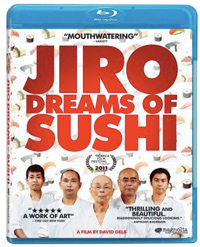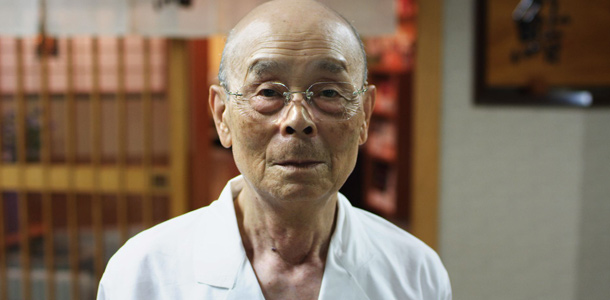Disc Reviews
Jiro Dreams of Sushi | Blu-ray Review
 Anyone who is a fan of The Food Network will attest to their curious attraction to watching the preparation of food. It is part of human nature. Knowing we will not be able to smell or taste the images on screen makes no difference, as our primal connection with food has us locked in, mouths watering at the mere sight and sound of the succulent dishes being prepared before our eyes. For fans of the sea born delicacies of sushi, this is the main appeal of Jiro Dreams of Sushi, the debut feature doc by director David Gelb. While researching for his sushi focused film, he discovered a man that encapsulated the entirety of his cinematic vision in Jiro Ono, an 85 year old master sushi chef and owner of Sukiyabashi Jiro, the only restaurant of its kind awarded the extraordinary three star Michelin rating. Jiro has devoted his life to the perfection of his classically simplistic cuisine, and in the Japanese tradition, he has passed his skills onto his two sons, Yoshikazu and Takashi, with hopes of them carrying on his legend.
Anyone who is a fan of The Food Network will attest to their curious attraction to watching the preparation of food. It is part of human nature. Knowing we will not be able to smell or taste the images on screen makes no difference, as our primal connection with food has us locked in, mouths watering at the mere sight and sound of the succulent dishes being prepared before our eyes. For fans of the sea born delicacies of sushi, this is the main appeal of Jiro Dreams of Sushi, the debut feature doc by director David Gelb. While researching for his sushi focused film, he discovered a man that encapsulated the entirety of his cinematic vision in Jiro Ono, an 85 year old master sushi chef and owner of Sukiyabashi Jiro, the only restaurant of its kind awarded the extraordinary three star Michelin rating. Jiro has devoted his life to the perfection of his classically simplistic cuisine, and in the Japanese tradition, he has passed his skills onto his two sons, Yoshikazu and Takashi, with hopes of them carrying on his legend.
Tucked away in the basement of a Tokyo office building, near the busy subway platform that runs through it, Sukyabashi Jiro has for decades been quietly serving what many consider to be the best sushi on the planet. The only thing on the menu, sushi, and of utmost simplicity. At its core, rice and fish of varying types are the basis of nearly every item. One might wonder what exactly makes Jiro’s fare so unique, but with only ten seats in the restaurant, to get a taste one must book a seat an entire month in advance. Clearly, Jiro Ono has created something special with his humble vocation.
At the age of 10, Jiro found his life’s passion in the meticulous culinary craft of sushi preparation. He has spent the last 75 years since following a strict daily routine, the ultimate goal being sushi perfection. His ethos are that of the shokunin, a Japanese term referring to a people of repetitive action, devoted to the improvement of their chosen craft. Jiro believes you must choose a profession at a young age and devote your life to it, spending all of your time improving yourself for the betterment of your craft. As a traditionalist, he even convinced both of his children not to attend college to work for him as soon as they graduated from high school. In preparation for Jiro’s eventual passing, he has trained both of his son’s in his unequaled skill set. As the oldest son, Yoshikazu is set to take over Sukyabashi Jiro when his father passes, while Takashi has opened his own restaurant, constructed as a mirror image of his father’s, serving the same straightforward dishes.
Gelb’s documentation is in perfect harmony with his subjects. Like the man and the simple cuisine the film is exemplifying, Gelb’s film is set in a relaxed pace, often letting the camera linger on every little detail of sushi preparation as it plays out in slowed to quickened motion. He often seems a man pulled out of time, a traditionalist moving through an alien modern world, but in his restaurant, he is an all-knowing master. Through observation and occasional insight we learn of his exceptional talent and expansive knowledge of his ingredients. Along with Jiro and Yoshikazu, we visit the early morning fish market, learning how he selects what will be on each day’s menu. Food critics, fish vendors, and rice dealers speak on their behalf, all overflowing with praise of quality and humility.
Jiro is often taken as a serious man of few words, standing stoically behind his counter as his patrons gorge themselves with his creations. The film actually begins with Jiro starring straight into the camera with a statement of his beliefs on work ethic, but we soon find that behind his successfully rigid ideologies, he is a light-hearted soul, working with love and family in mind. Jiro Dreams of Sushi is not just a magnetic story of an extraordinary chef and the heirs to his legacy, but a magnificent meditation on success through tradition, repetition and devotion to a single lifelong craft, and in a world moving perpetually faster, we could all use to slow down and enjoy some food conceived with modest passion, even if its just on screen.
The Disc:
With yet another solid release this year, Magnolia have put together some great extras to compliment this wonderful new doc. Gelb used the Red One to shoot most of the film, and with the glorious transfer the film received, the image looks nearly flawless. He used a very shallow depth of field for much of his shooting, resulting in shots that struggle to find his focus, but when he finally finds it, there is incredible clarity in facial detail, as well as they extensive footage of the sushi itself. The audio moves through a DTS-HD 5.1 track that, although doesn’t ever sound overly impressive, does a good job reproducing voices in particular. There were only fleeting moments of surround use. The disc itself comes packaged in a standard Blu-ray case.
Audio Commentary with director David Gelb and editor Brandon Driscoll-Luttringer
This is a very forthcoming audio track with a generally lively conversation about the making of the film that shows both Gelb and Driscoll-Luttringer thought very deeply about nearly every decision in the filmmaking process. They talk about different cuts of the film that they ended up changing, how they captured specific interviews, why they chose specific musical pieces and even touch on the often criticized Japanese fishing industry.
Deleted Scenes
Documentary footage from the cutting room floor is often much more interesting than that of a fiction film, and here this is very much the case. With 20 minutes of deleted scenes, we find out much more about Jiro’s life outside of his profession, his thoughts about what perfection actually means, how he was trained at the fish market, as well as several other lovely scenes that were probably cut because of poor sound or technical malfunctions.
Masters
This collection of snippets features more interviews with the people that Jiro gets his ingredients from, such as the tuna dealer, he shrimp dealer, the octopus dealer, and the rice dealer. We find out what makes them excel at their jobs, and why their product is superior to other dealers in Jiro’s eyes.
Sushi Gallery
This is a brief piece that highlights every piece of sushi that is served at Jiro’s restaurant, each with several camera angles and matching on screen names, both in Japanese and English.
Theatrical Trailer
Beautifully introducing the protagonists while setting up the conflict of handing over the restaurant to Jiro’s older son, this trailer perfectly sums up the film while not really giving away why the film works so well.
Final Thoughts:
Jiro Dreams of Sushi is truly great because of the way it portrays simplicity and passion through telling the story of an aging master chef and his sons. As someone who grew up without a real family, he has created a loving family with sons who aspire to be like him. Strangely, we learn very little of Jiro Ono outside of his work, never even seeing or hearing of his wife or hobbies, but what we do learn through his craft and interspersed self told memories is of great weight. Winding Jiro’s history with that of his sushi, Gelb has made a fascinating piece of non-fictional cinema that brings the word of Jiro’s legend abroad with delicate balance and composure, and a deep respect for the delicate cuisine of sushi.































